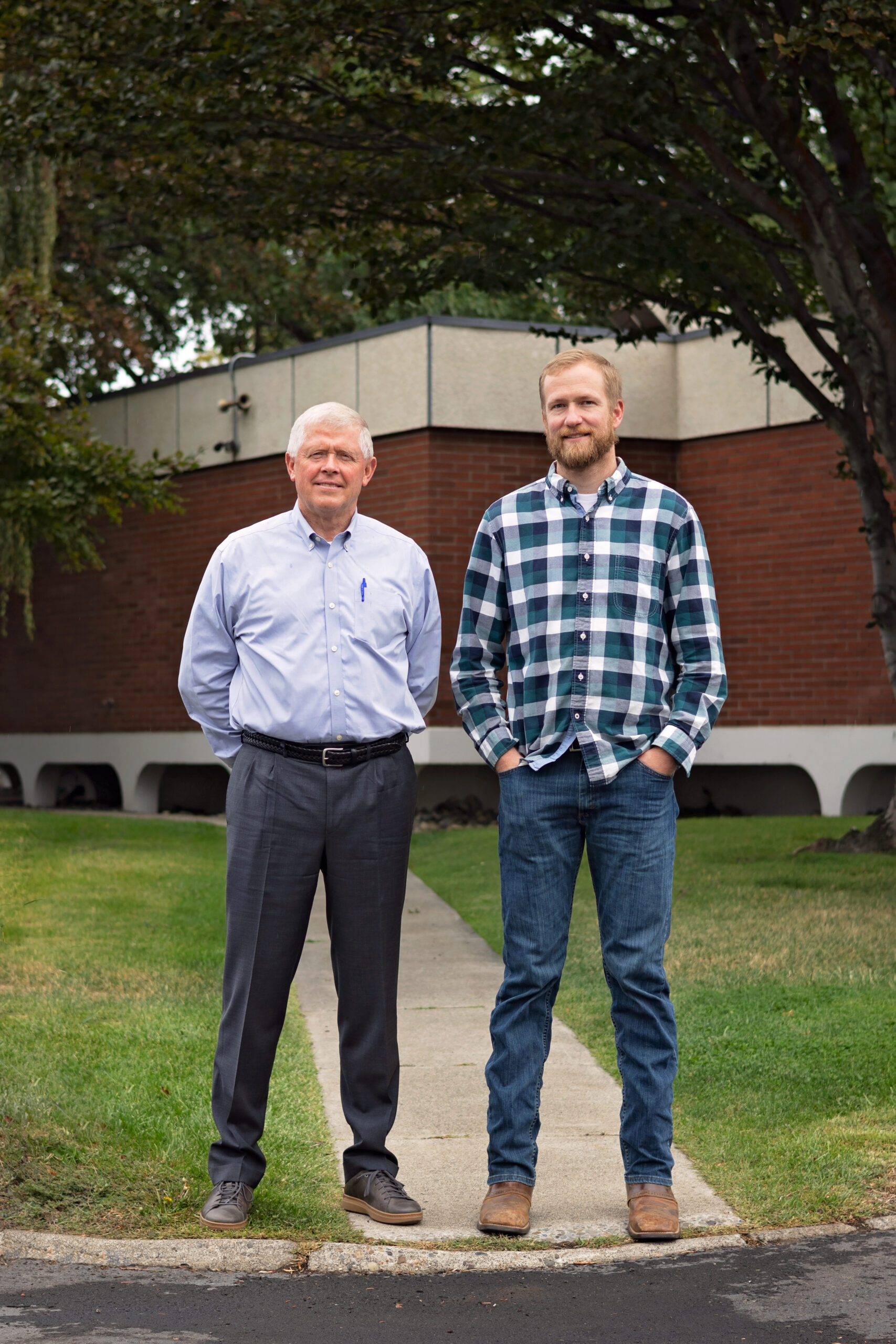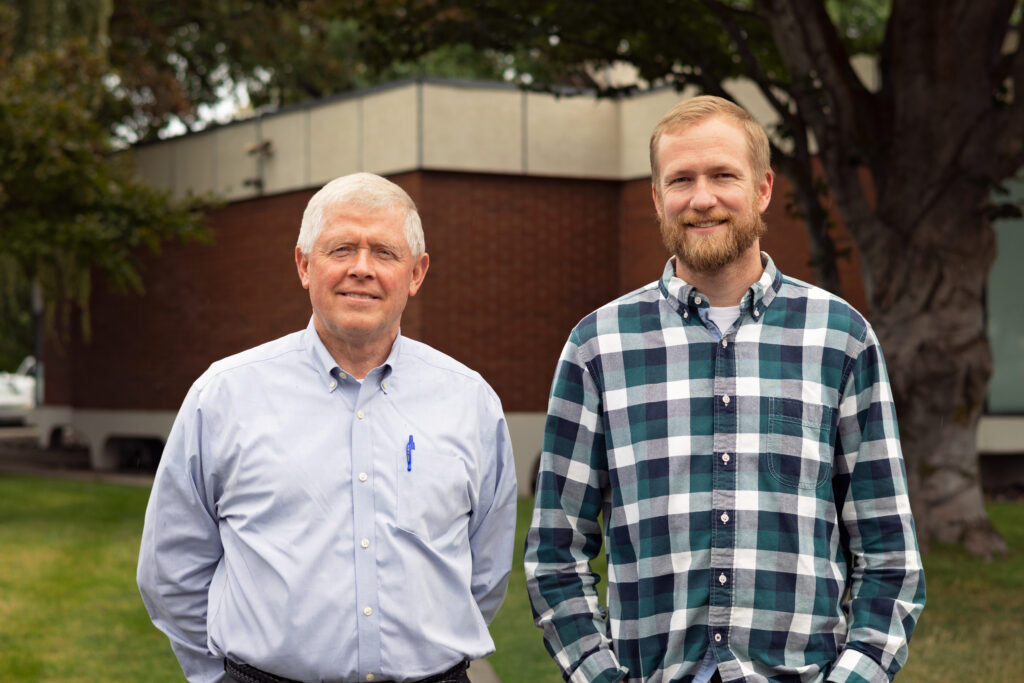Jason Adler has officially transitioned to the Chief Financial Officer (CFO) at Kittitas Valley Healthcare.
Wait a minute! Congratulations are in order. Jason advanced within the Kittitas Valley Healthcare system through hard work, dedication and a little mentoring from Scott Olander, our outgoing CFO. I met with Scott and Jason to get to know a little bit more about advancement opportunities within the KVH family and how Jason prepared for his new role.
How it started…
“Mentoring began for me when I started here with Jason,” Scott declared as he took his glasses off to see a little better. “He was interested in learning. He’d done a lot of work previously on pieces of the cost report, and he’d been involved in pieces of contract negotiations and things like that. But he was interested and he had actual knowledge of the organization. So, it was informally at that point, but it was right from the very, very beginning.” He said, turning to Jason, to pass the baton.
Jason added, “Yeah. [mentoring] was both ways. I think I expressed willingness to learn. And he expressed he had a lot of knowledge that I realized real quick that I could take from his past experiences and leverage it for KVH.”

“Yeah!” Scott exclaimed, ignited by something Jason had said, “Jason’s really strong with the data and technical analysis and stuff like that. And I’m not. I understand the data, but I’m not good at pulling the data. So, I’ve learned that mentoring, the learning, I guess, has gone both ways from my perspective.”
I then asked about the process of being mentored and the benefits of doing internal hires as opposed to hiring positions externally.
Scott quickly chimed in, “It was a board assignment to work towards some continuity and progression through retirements and turnover transitions. Also, just to demonstrate to the entire organization to be thinking in this capacity of continuity and transition planning. Julie wanted all the department leaders or all the organizational leaders to kind of identify a succession plan and to identify individuals that we would mentor and coach to prepare for potential future opportunity.”
Scott, continuing his train of thought, “I personally think that some of your best hires are within the organization [because] they are committed to the community; they’re committed to the organization. There’s always bright people elsewhere that you can bring in, but they may not have the commitment to the community.”
With that strong perspective in mind, I asked what they both would do moving forward, what are they going to steal from one another’s’ styles.
Jason responded, “Being open and collaborative. I think I would steal from Scott trying to be always more collaborative with others’ perspective and slow down a bit but to also keep a pace going. So, set[ting] expectations and pace [within collaborations].”
Scott, adding these clarifying remarks, “You know, there are things that Jason approaches differently than I do. And there’s no right or wrong answers. There’s different answers, different approaches. I am excited about the opportunity to [transition] to rev cycle. I think it will make the organization better. It’ll make the rev cycle better. We’ll be better.”
Jason, remembering a thought from before, “Something that I did learn from Scott, is to allow the managers and support the managers in what they feel they are needing to accomplish their task. Whether that’s FTEs or contractors or supplies, services, to really listen to them and support their needs. I think that I will challenge some of the mangers in some ways too.”
“Probably more so than I did,” Scott said with a chuckle, “Which is understandable. Which is a good change.” Scott says as if to finish Jason’s thought.
Where it’s headed…
I asked them both if they had any advice for employees wanting to advance within the organization or even laterally move and learn new skills.
Jason, with the first thought, “Go to HR and say, “Hey, I’m interested in other roles. Keep your ears open with what might be a good fit.” You can dabble in other areas and gain experience.”
Scott, being contemplative, “From the employee side, I think, if they’re willing to be patient and to work hard, and be willing to do different things, one of the things that distinguished Jason is he was willing to try other things and take on other assignments. And to the degree that you, as he described, as a small organization, there’s not necessarily a clear path to the other positions and other opportunities. It’s not readily apparent. But if you work hard and are patient, those opportunities come around, they really do.”
Continuing while gesturing to Jason, “It’s kind of the same thing that happens with Jason. You know, he was an analyst, he worked with a lot of people within the organization, particularly with budgeting and…” he said trailing off.
“Hard work definitely breeds trust.” I interjected trying to guess his unfinished phrase.
“Mm-hmm.” Scott responded immediately.
Jason, rounding out his last thoughts, “For successful mentorship and personal experiences is just having that really high respect for your mentors and mentees and everybody around you, really. Keep that healthy amount of friction, push back, but have that very healthy respectful balance there.”
In conclusion, we agreed that within our KVH organization, we foster giving employees a voice. And when people have a voice, they can feel invested. Being invested leads to action and hard work and that, leads to opportunity. And mentoring and being mentored IS opportunity.
Opportunities await…
